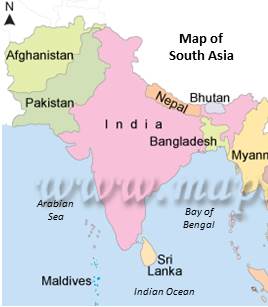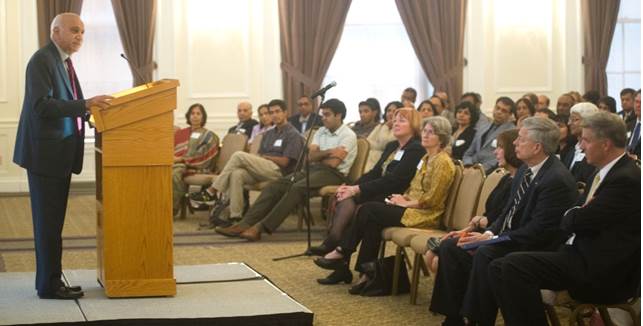By Premlata Venkataraman
e-mail: Â ThePatrika@aol.com
Mobasher Jawed Akbar, popularly known as MJ Akbar, the official spokesperson for the Bharatiya Janata party (BJP) spoke on September 30 at the University of Pittsburgh on “India After the 2014 Elections.†His talk focused on the “new leadership, priorities and possibilities.â€
For the geopolitical and business interests of the US, India is strategically important. So, the University of Pittsburgh started this year an annual lecture series at its South Asian Studies department. India is front and center of South Asia not only in geography (see the  map), but also in culture, history, and economy. Akbar was the first speaker in this series.
map), but also in culture, history, and economy. Akbar was the first speaker in this series.
Akbar’s is a well-known name in India and in the Indian subcontinent. His name as a journalist is associated with a long list of well-known publications. He also was a Congress Party MP and served as the official spokesperson for Rajiv Gandhi when he was India’s prime minister. Currently Akbar is the spokesperson for the BJP, which he joined just two months before the 2014 elections — talk about good timing. How many political operatives in the world’s large democracies have been so close to two diametrically opposed political systems?
Akbar was introduced to the audience of over 200 people by Mark Nordenberg, who recently ended his long tenure as the university’s chancellor. Nordenberg, as he told his audience, is related to Akbar as sambhandhi,with his son marrying Akbar’s daughter.
Akbar started by stating that India’s impatient youth — 54% of the population is under 25 years of age — had reached a point where the lethargic status-quo was no longer acceptable, which was the main reason for BJP’s spectacular victory, with Modi becoming India’s Prime Minister. He highlighted the changes the BJP has made by focusing on four decisions.
• Abandoning the Planning Commission, a relic of the Soviet model of planning adopted by Jawaharlal Nehru and the Congress Party. The post-colonial reality of India was that 60% of people lived below the poverty line. Even 60 years after India’s independence poverty was reduced only by half. The BJP believes in poverty elimination not alleviation.
Government wants the private sector to create millions of new jobs. Government wants to do this while protecting the environment and the poor. BJP looks beyond the ideology from both the Left and the Right, and will pursue ideas that work.
• Secondly, Modi recognizes that “Trickle Down economics,†a term popularized by Ronald Reagan in the 1980s, does not work. Even the poorest need to be an integral part of India’s economy, and that is why it brings these people into India’s formal banking sector. Empowering people at the bottom gives them much needed purchasing power wjhgich benefits India’s manufacturing and service sectors.
• Third, Modi’s background gives him a better understanding of the difficulties of those stuck in the cycle of poverty. He addressed the need for toilets for every Indian from the Red Fort in his Independence Day speech. He took part in the Global Citizen’s concert at Central Park, joining in efforts to provide access to toilet for all in India. This initiative will give basic dignity to women in rural India, so that girls feel safe going to school (but only when fulfilled, we must say).
• Fourth, Akbar emphasized that the secularism of India predates by many centuries the secularism of Europ., India accepts all faiths and belief systems. It is in the very fiber of every Indian. Gandhiji is the best symbol of secularism in India, gaining inspiration from the Hindu, Christian and Muslim faiths. Modi, he said, wants the Muslims to be strong in their faith but modern in outlook and participate in India’s growth. Indian Muslims are as patriotic as anybody else in India.
Modi’s vision, Akbar said, is looking towards the East. Symbolically, Modi came to the United States after visiting Japan and after Chinese President Xi’s state visit to India. In Akbar’s choice of words, “East of India is growth, prosperity and productivity, and west of India is a wasteland all the way up to Morocco on the west coast of Northern Africa.â€Â Only three countries, India, Iran and Israel, he said, have stable governments and democracy. The Middle East, he said, is slipping into medievalism.
On the question of Pakistan, Akbar was quite blunt. Alluding to the rise of Syria’s Islamic State, IS, Akbar said, “Pakistan is the first Islamic State,†and hence a natural home for Osama Bin Laden. While the US has sought Pakistan as a solution to their terrorism problems, Akbar said, India sees Pakistan as a problem.   ♦

